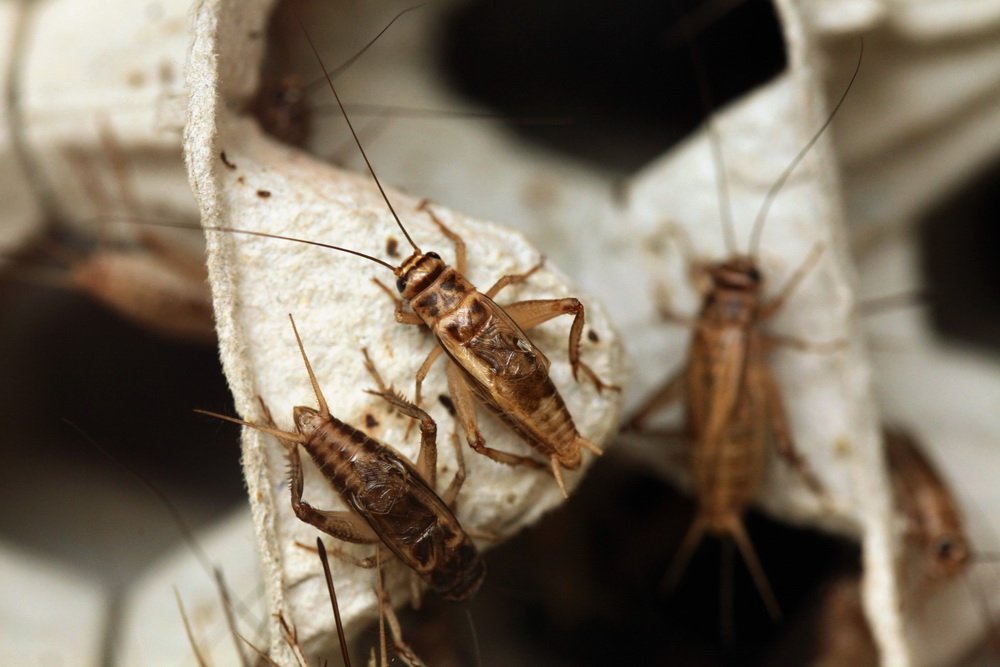Originally published at: How to get rid of crickets? - Thanos Home
Crickets are small and medium-sized, yellowish-brown (sometimes dark) insects that are largely unwanted around the house for many reasons.
The persistent noise they make can make a human environment almost inhabitable.
This noise is caused by male crickets trying to attract females, or by males trying to warn others of their territory.
There are about 2,400 species of crickets all over the planet.
Some of them inhabit the home and can cause serious problems and concerns for every homeowner.

They are mostly found in the lawn near the home and the lawn of residential areas. They can also be found near windows, and these windows can also serve as entry points for them.
If you are experiencing a cricket infestation inside your home, then you need to look for ways to control or get rid of them as soon as you can.
So, as you look for how to get rid of crickets, you can look out for the entry points, the noise they make, or any damage they do around the home.
Once you have identified and fully confirmed that you have a cricket infestation, you may then move ahead to find ways to keep them out of your house.
Luckily, this article explains ways on how to get rid of house crickets. It is sure to be helpful.
Why Do I Have Crickets In My House
Nobody wants an insect invasion around their house.
Likewise, everyone wants their property to be free of pests. If you have these pests disturbing your home, you may need to first, know what keeps attracting them before finding ways to prevent and get rid of crickets.
They can be a huge nuisance around the house, and once you know what attracts them and what they are drawn to, you may proceed to get rid of crickets and prevent them from returning back.
They are mainly attracted to sources of food, shelter, and light, just like most insects, rodents, and pests.
so, to be free of them, you have to make sure you deal with the things that attract them in the first place.
Crickets love plants-any kind of plant and dead insects. They also feed on dead crickets when they see one.
So, if your house has any of these in abundance, crickets will be attracted.
They also eat fabrics, and clothing, especially wool-silk clothes that are dirty and sweaty. If your home also has a lot of debris, then the possibility of cricket infestations is high.
Outside of your homes, they are always attracted to leaking water basements, and dirty places generally.
Crickets will also feast on pet food if you keep them in areas where the crickets will access them. so, one way of getting rid of crickets is to seal leaking pipes when you find one.
Although crickets are attracted to places that can provide them with food, they can only get in your house if your house provides them with a suitable shelter.
They like places that are warm naturally, so if a home is warm, dirty, and has cracks on the windows and other entry points, they will invade such a place. You also want to ensure that you seal all openings with which they gain entry into your propery.
They almost always seek shelter from harsh conditions and can be attracted to a place that has any of the conditions stated.

What Smell Do Crickets Hate
Crickets are not fans of peppermint smell.
Peppermint helps to repel pests when you spray them around the affected area.
A Cricket IS not left out. They do not enjoy the smell, and once applied inside the home, they will aid in getting rid of them.
1 Peppermint Oil
Peppermint oil can also aid in repelling them if effectively applied. Once the crickets come across this smell, which they do not enjoy whatsoever, they move off.
2 Lemon Oil
Crickets hate the smell of lemon too.
All you have to do is to spray the lemon juice in the house, on floors, and on boards. This will push them and help to get rid of crickets since they do not enjoy the smell.
3 Cinnamon Oil
Cinnamon repels crickets too, so it would make sense if you spray cinnamon oil around regularly.
Because they do not enjoy the smell. Therefore, they are driven back when they come across it.
Cinnamon sprinkled along all the doorways inside the house will help keep pests like crickets away because they do not enjoy the smell.
How Do You Get A Cricket To Stop Chirping
When crickets make sounds inside or anywhere near your home, the noise made can constitute a nuisance which in itself is one of the reasons why people may try to keep this pest out of their surroundings.
The best way to stop crickets from chirping will be to send them away.
Crickets can only disturb you with their sound if they are close to your home.
Therefore, eliminating them is as good as silencing them
To eliminate them, all their sources of water and food must be obliterated.
Without food ( including the pest they feed on) and water, they will be forced to leave in search of a more conducive place. And this will, in turn, stop their chirping.
Crickets like places that are moist. Once you eliminate the moist areas where they inhabit, they will have to survive in a better environment.
Crickets can also be chilled out.
Because they love warm temperatures, their chirping can be silenced if the rooms where they are chirping are fitted with air conditioning. The cold room will force them to get out and stop their chirping.
Doing this to silence crickets maybe somehow extreme.
Because you might want the room just as warm as they want it and fixing an air conditioner in place of finding a lasting solution to chirping insects might not be the best move to take.
You can also use cricket traps.
These traps vary in use based on different products.
You are to use the traps and the products meticulously. The sticky traps are some of these traps you can apply.
Another way to stop crickets from chirping is to rid the crickets by killing them. Just like repelling, this may also stop their noise.
In doing this, pest control agencies with the rights reserved to carry out extermination can be called to help kill crickets.
These agencies will use their expertise in pest control by using strong agency-approved pesticides and products that can help to control and eliminate the crickets.
This will inadvertently shut the crickets up from chirping and from further causing chaos and noise.

What Time Of The Year Do Crickets Go Away
Crickets like warm weather and they cannot live under conditions that are extremely cold for them. They typically appear in the summer when the weather is warm and very accommodating.
Because the adults only live for about eight weeks, they begin to die off after mating and laying eggs for crickets’ next cycle.
So, by the time it is winter, and it gets cold, they begin to die, one after the other, and the noise also dies.
Generally, crickets typically die and go away in the winter when the temperature is below 70-90 Fahrenheit. They, however, lay eggs and make sure the eggs are safe.
Conclusion
These nocturnal beings do not hold any health disadvantage, and they are fun to listen to in the woods and other places away from homes and residential areas.
However, once they infest a human environment, they easily become pests that are sought to be eliminated.
If you have crickets house infestation, you have to make sure that you find a way to eliminate the house cricket invasion for your own peace and serenity.
Luckily, this article explains the things you need to know about how to get rid of crickets. We hope it was helpful.
